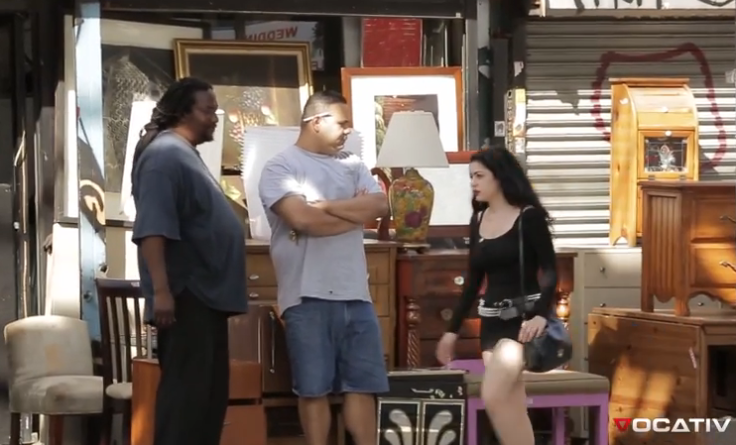Catcalling Caught On Camera: Woman Records Street Harassment She Faces Throughout The Day

The unwanted gawking, whistling, sexist taunts, and/or physical contact are a part of the daily reality for women of all walks of life who find themselves targets of the all-American pastime: catcalling. Women who frequent city sidewalks are subjected to those taunts and insults, which have even been depicted as a cultural norm in television shows like Sex and the City, songs from the 1950s and 60s, and even in children’s cartoons. In a short documentary by Vocativ, an online news website, several women share their harassment experiences, and one interviewee agrees to wear a hidden camera to capture her experience with street harassment while walking around her city.
"I know the way I dress is kind of provocative but it doesn't mean I should have to deal with it," says the interviewee to Vocativ. Another interviewee poses the question, “Do I think women should be judged or harassed based on what they wear?” “Absolutely not.” This is a slippery slope that leads to the argument shared by several men and women — girls who wear short skirts are asking for it.
In one of her experiences, the hidden camera captured the interviewee confronting a catcaller saying “sexy,” to which she responds “go to hell.” This exchange in dialogue suggests taking back the power in the moment from the harasser to the woman, which reinforces the idea women are in control of their bodies. Standing up for themselves can help educate men on street harassment, but many women fear responding to their harassers can escalate and even lead to physical violence.
The documentary also shares the story of Jen Corey, a former Miss America finalist who advocates against street harassment. In an interview, she talks about being physically violated on the Washington, D.C., metro last year coming from work. “Slowly I started to feel something touch me from behind,” she says. “I could still feel the pressure more and more building into pushing into behind me. I could see that he had his hand in his pants.” Corey acknowledges as an advocate she should’ve known what to do, but she just immediately started crying after she escaped from the harasser.
Despite Vocativ and Corey’s efforts to document the horrors of street harassment, and reminding women it’s not OK for someone to touch you, some people continue to turn a blind eye. Corey has been bombarded with tweets to try to prove her wrong since the documentary was released. Clearly, a lot of work must be done before women can walk on the streets without the sexist taunts, insults, and catcalls.
The number of tweets I'm getting telling me I'm WRONG to call an end to Street Harassment show what's wrong with society. #victimblaming
— Jen Corey (@MissDC2009) July 30, 2014A 2014 survey conducted by Stop Street Harassment, a nonprofit advocacy organization, found that 65 percent of women in the U.S. across all ages, races, income levels, sexual orientations, and geographic locations had experienced some type of harassment on the street in their lifetimes. This includes verbal attacks, flashing, or even being forced to perform sexual acts. The SSH calls this "a human rights violation and a form of gender violence.”
This is an unfortunate reality women have to go through their lives every single day.
Published by Medicaldaily.com



























